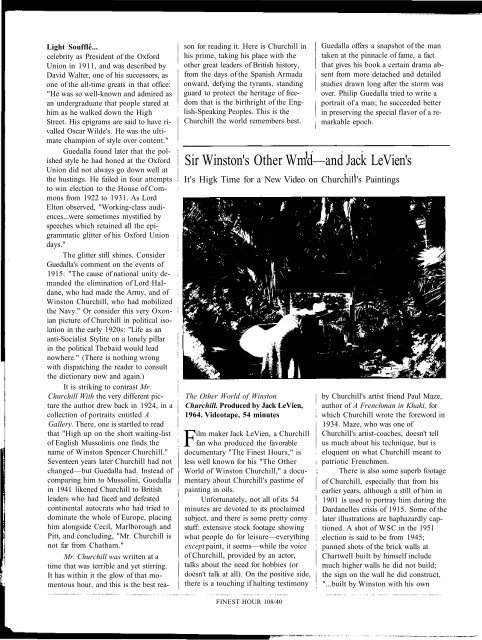journal of the churchill center and societies - Winston Churchill
journal of the churchill center and societies - Winston Churchill
journal of the churchill center and societies - Winston Churchill
- No tags were found...
You also want an ePaper? Increase the reach of your titles
YUMPU automatically turns print PDFs into web optimized ePapers that Google loves.
Light Souffle...<br />
celebrity as President <strong>of</strong> <strong>the</strong> Oxford<br />
Union in 1911, <strong>and</strong> was described by<br />
David Walter, one <strong>of</strong> his successors, as<br />
one <strong>of</strong> <strong>the</strong> all-time greats in that <strong>of</strong>fice:<br />
"He was so well-known <strong>and</strong> admired as<br />
an undergraduate that people stared at<br />
him as he walked down <strong>the</strong> High<br />
Street. His epigrams are said to have rivalled<br />
Oscar Wilde's. He was <strong>the</strong> ultimate<br />
champion <strong>of</strong> style over content."<br />
Guedalla found later that <strong>the</strong> polished<br />
style he had honed at <strong>the</strong> Oxford<br />
Union did not always go down well at<br />
<strong>the</strong> hustings. He failed in four attempts<br />
to win election to <strong>the</strong> House <strong>of</strong> Commons<br />
from 1922 to 1931. As Lord<br />
Elton observed, "Working-class audiences...were<br />
sometimes mystified by<br />
speeches which retained all <strong>the</strong> epigrammatic<br />
glitter <strong>of</strong> his Oxford Union<br />
days."<br />
The glitter still shines. Consider<br />
Guedalla's comment on <strong>the</strong> events <strong>of</strong><br />
1915: "The cause <strong>of</strong> national unity dem<strong>and</strong>ed<br />
<strong>the</strong> elimination <strong>of</strong> Lord Haldane,<br />
who had made <strong>the</strong> Army, <strong>and</strong> <strong>of</strong><br />
<strong>Winston</strong> <strong>Churchill</strong>, who had mobilized<br />
<strong>the</strong> Navy." Or consider this very Oxonian<br />
picture <strong>of</strong> <strong>Churchill</strong> in political isolation<br />
in <strong>the</strong> early 1920s: "Life as an<br />
anti-Socialist Stylite on a lonely pillar<br />
in <strong>the</strong> political Thebaid would lead<br />
nowhere." (There is nothing wrong<br />
with dispatching <strong>the</strong> reader to consult<br />
<strong>the</strong> dictionary now <strong>and</strong> again.)<br />
It is striking to contrast Mr.<br />
<strong>Churchill</strong> With <strong>the</strong> very different picture<br />
<strong>the</strong> author drew back in 1924, in a<br />
collection <strong>of</strong> portraits entitled A<br />
Gallery. There, one is startled to read<br />
that "High up on <strong>the</strong> short waiting-list<br />
<strong>of</strong> English Mussolinis one finds <strong>the</strong><br />
name <strong>of</strong> <strong>Winston</strong> Spencer <strong>Churchill</strong>."<br />
Seventeen years later <strong>Churchill</strong> had not<br />
changed—but Guedalla had. Instead <strong>of</strong><br />
comparing him to Mussolini, Guedalla<br />
in 1941 likened <strong>Churchill</strong> to British<br />
leaders who had faced <strong>and</strong> defeated<br />
continental autocrats who had tried to<br />
dominate <strong>the</strong> whole <strong>of</strong> Europe, placing<br />
him alongside Cecil, Marlborough <strong>and</strong><br />
Pitt, <strong>and</strong> concluding, "Mr. <strong>Churchill</strong> is<br />
not far from Chatham."<br />
Mr. <strong>Churchill</strong> was written at a<br />
time that was terrible <strong>and</strong> yet stirring.<br />
It has within it <strong>the</strong> glow <strong>of</strong> that momentous<br />
hour, <strong>and</strong> this is <strong>the</strong> best reason<br />
for reading it. Here is <strong>Churchill</strong> in<br />
his prime, taking his place with <strong>the</strong><br />
o<strong>the</strong>r great leaders <strong>of</strong> British history,<br />
from <strong>the</strong> days <strong>of</strong> <strong>the</strong> Spanish Armada<br />
onward, defying <strong>the</strong> tyrants, st<strong>and</strong>ing<br />
guard to protect <strong>the</strong> heritage <strong>of</strong> freedom<br />
that is <strong>the</strong> birthright <strong>of</strong> <strong>the</strong> English-Speaking<br />
Peoples. This is <strong>the</strong><br />
<strong>Churchill</strong> <strong>the</strong> world remembers best.<br />
Guedalla <strong>of</strong>fers a snapshot <strong>of</strong> <strong>the</strong> man<br />
taken at <strong>the</strong> pinnacle <strong>of</strong> fame, a fact<br />
that gives his book a certain drama absent<br />
from more detached <strong>and</strong> detailed<br />
studies drawn long after <strong>the</strong> storm was<br />
over. Philip Guedalla tried to write a<br />
portrait <strong>of</strong> a man; he succeeded better<br />
in preserving <strong>the</strong> special flavor <strong>of</strong> a remarkable<br />
epoch.<br />
Sir <strong>Winston</strong>'s O<strong>the</strong>r Wmd—<strong>and</strong> Jack LeVien's<br />
It's Higk Time for a New Video on <strong>Churchill</strong>'s Paintings<br />
The O<strong>the</strong>r World <strong>of</strong> <strong>Winston</strong><br />
<strong>Churchill</strong>. Produced by Jack LeVien,<br />
1964. Videotape, 54 minutes<br />
Film maker Jack LeVien, a <strong>Churchill</strong><br />
fan who produced <strong>the</strong> favorable<br />
documentary "The Finest Hours," is<br />
less well known for his "The O<strong>the</strong>r<br />
World <strong>of</strong> <strong>Winston</strong> <strong>Churchill</strong>," a documentary<br />
about <strong>Churchill</strong>'s pastime <strong>of</strong><br />
painting in oils.<br />
Unfortunately, not all <strong>of</strong> its 54<br />
minutes are devoted to its proclaimed<br />
subject, <strong>and</strong> <strong>the</strong>re is some pretty corny<br />
stuff: extensive stock footage showing<br />
what people do for leisure—everything<br />
except paint, it seems—while <strong>the</strong> voice<br />
<strong>of</strong> <strong>Churchill</strong>, provided by an actor,<br />
talks about <strong>the</strong> need for hobbies (or<br />
doesn't talk at all). On <strong>the</strong> positive side,<br />
<strong>the</strong>re is a touching if halting testimony<br />
by <strong>Churchill</strong>'s artist friend Paul Maze,<br />
author <strong>of</strong> A Frenchman in Khaki, for<br />
which <strong>Churchill</strong> wrote <strong>the</strong> foreword in<br />
1934. Maze, who was one <strong>of</strong><br />
<strong>Churchill</strong>'s artist-coaches, doesn't tell<br />
us much about his technique, but is<br />
eloquent on what <strong>Churchill</strong> meant to<br />
patriotic Frenchmen.<br />
; There is also some superb footage<br />
<strong>of</strong> <strong>Churchill</strong>, especially that from his<br />
earlier years, although a still <strong>of</strong> him in<br />
1901 is used to portray him during <strong>the</strong><br />
Dardanelles crisis <strong>of</strong> 1915. Some <strong>of</strong> <strong>the</strong><br />
later illustrations are haphazardly captioned.<br />
A shot <strong>of</strong> WSC in <strong>the</strong> 1951<br />
election is said to be from 1945;<br />
panned shots <strong>of</strong> <strong>the</strong> brick walls at<br />
Chartwell built by himself include<br />
much higher walls he did not build;<br />
<strong>the</strong> sign on <strong>the</strong> wall he did construct,<br />
"...built by <strong>Winston</strong> with his own<br />
FINEST HOUR 108/40

















